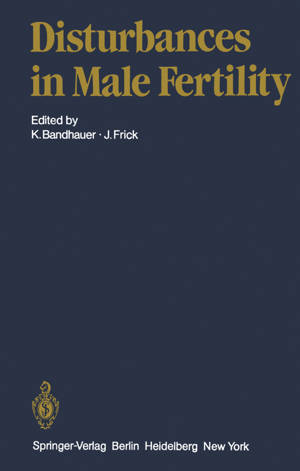
- Afhalen na 1 uur in een winkel met voorraad
- Gratis thuislevering in België vanaf € 30
- Ruim aanbod met 7 miljoen producten
- Afhalen na 1 uur in een winkel met voorraad
- Gratis thuislevering in België vanaf € 30
- Ruim aanbod met 7 miljoen producten
Zoeken
Disturbances in Male Fertility
K Bandhauer, G Bartsch, D M De Kretser, A Eshkol, J Frick, M Glezerman, J B Kerr, B Lunenfeld, W Pöldinger, H P Rohr, F Scharfetter, P D Temple-Smith
€ 150,48
+ 300 punten
Omschrijving
Impending famine and a terrifying rate of consumption of natural resources are vital issues which have focussed public interest in the ecologic, social and political problems of ever increasing overpopulation in many countries of the world. As well as the vast material and intellectual expenditure lavished on family planning and birth control, the past decade has seen an immense research effort in the elaboration of improved methods of fertility control, both for men and for women. During the same period, however, research into the causes of male fertility disorders has proceeded with equal intensity, and a number of promising therapeutic approaches have become the subject of clinical trials. The wish of an individual or of a couple to have offspring is an absolute which requires no further justification, and there can be few challenges to a physician as essential as the spouses' predicament in a childless marriage. Only with a special knowledge of the function, pathology and pathophysiology of the reproductive system is he properly equipped to meet that challenge.
Specificaties
Betrokkenen
- Auteur(s):
- Uitgeverij:
Inhoud
- Aantal bladzijden:
- 456
- Taal:
- Engels
- Reeks:
- Reeksnummer:
- nr. 16
Eigenschappen
- Productcode (EAN):
- 9783642651199
- Verschijningsdatum:
- 15/11/2011
- Uitvoering:
- Paperback
- Formaat:
- Trade paperback (VS)
- Afmetingen:
- 170 mm x 244 mm
- Gewicht:
- 762 g

Alleen bij Standaard Boekhandel
+ 300 punten op je klantenkaart van Standaard Boekhandel
Beoordelingen
We publiceren alleen reviews die voldoen aan de voorwaarden voor reviews. Bekijk onze voorwaarden voor reviews.








